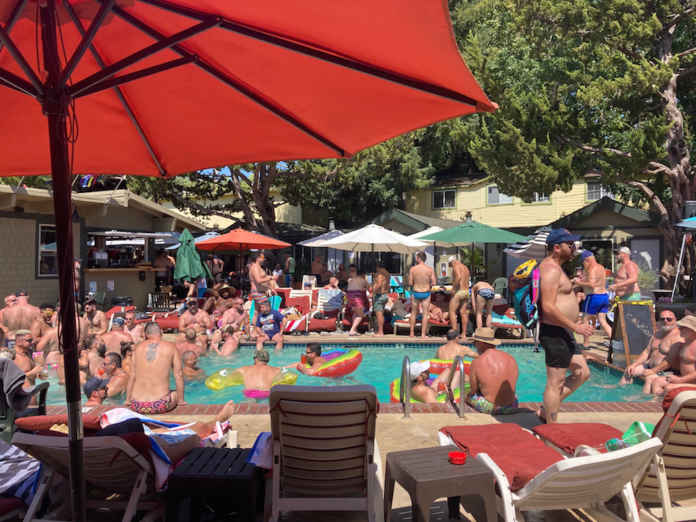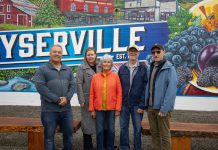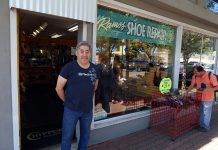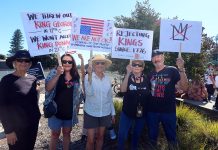
Following a COVID-19 outbreak over the weekend in Guerneville, Lazy Bear Week — an annual LGBT-themed event — began July 26, bringing desperately needed business to the hard-hit tourism economy of the Russian River region.
A “bear” is a large, hairy gay man, however, the label can be applied to persons of all body types who identify as such.
The continuation of the event highlights the compromise between managing the still-present dangers posed by COVID-19 to unvaccinated and even vaccinated persons, while facilitating tourism in a region racked by recent natural disasters, pandemic lockdowns, high cost of living and worker shortages.
‘The worst COVID outbreak we’ve seen’
A COVID-19 outbreak, primarily affecting Guerneville’s prevalent service industry worker population, was discovered July 24, prompting a prompt and effective response among community members ahead of the event.
Dr. Jason Cunningham of the Russian River Clinic, part of West County Health Centers, said he worked with local organizers like Jeniffer Wertz of the Russian River Alliance (RRA) to get service workers tested ahead of the bears’ arrival, several confirmed cases coming to their attention.
Cunningham said he worked with local health care workers to get rapid tests available Sunday through Monday, during which time they tested around 240 people. With Lazy Bear Week looming, Cunningham said that rapid tests were a better choice than the more accurate PCR tests, because the latter take three days to get results.
Of those tested, about 10 to 11% tested positive and were isolated. Health workers also tested the unhoused population living in their cars, but none tested positive.
Cunningham praised the Guerneville community for coming together to help protect people ahead of the event.
“I’m pretty proud of that community right now. That’s how we’re going to get through the COVID 一 it has to be a community effort,” he said.
While the county was unable to provide specific numbers on test positivity rates in Guerneville, at last update, Guerneville had 35 cases, or 618.6 cases per 100,000 residents, second only to Santa Rosa with 655.3 cases per 100,000 residents, according to SoCo Emergency.
A July 27 county press release states that active COVID-19 cases and related hospitalizations are at their highest since March.
Transmission rates and related illnesses have been increasing due to the increased transmissibility of the delta variant sweeping the state.
It was Wertz, Guerneville local and longtime volunteer with the RRA, who notified Cunningham of the possible outbreak. Wertz then activated a community phone tree to get the word out about the outbreak and pop-up testing sites.
Wertz said the outbreak may have been caused by recent unpermitted gatherings held by locals in which vaccination status was not considered.
Both Wertz and Cunningham praised the Lazy Bear organizers for precautionary measures taken to protect visitors and locals from COVID-19 transmission.
Keeping COVID-19 transmission to the “bear” minimum
Lazy Bear Week, a series of events hosted by the Lazy Bear Fund, a 501(3)c nonprofit that donates proceeds to nonprofits in the Russian River area and beyond, is celebrating its 25th year this year. Last year, amid pandemic-related lockdowns, Bear Week was held virtually, and while donations were collected, the ancillary economic benefits of the generally generous population visiting local shops, restaurants and hotels was lacking, underscoring the severity of economic damage the Russian River region has faced throughout the past year and a half.
David Barker, president of the Lazy Bear Fund, said the outbreak was largely handled prior to the bears’ arrival at the start of Bear Week, and organizers are confident they can still facilitate a fun and safe environment because of extensive preparations they’ve taken.
These measures include, first and foremost, requiring proof of vaccination at registration. In order to facilitate this measure, which ensures the gay bear population is entirely vaccinated and thus less likely to contract and transmit COVID-19, Lazy Bear organizers had to move away from allowing for daytrippers to purchase passes to singular events: participants this year are required to donate $200 for the “bear tags” that grant them access to the entire week’s events, even if they only want to attend one day’s events.
According to Barker, this is primarily a means of avoiding the logistical barriers that would present themselves in confirming vaccination status for would-be day trippers.
Other measures Barker mentioned include hosting all events outside, at locales such as the R3 resort and pool, the West Sonoma Inn and sites along the river, coast and forest. Attendees are encouraged to wear masks whenever inside throughout their stay, and those experiencing symptoms of COVID-19 are asked to isolate or depart.
The Lazy Bear Fund’s precautions have allowed for the event to go on, even with a smaller number of participants than pre-COVID years. Generally, the event attracts about 3,000 people to the region; this year’s numbers are expected to be less than half that, per Barker’s estimation.
“We planned for a worst case scenario, and as it turned out, this is the worst case scenario,” Barker said.
Barker conceded that despite precautions, there will almost certainly be some transmission between the vaccinated people participating in this week’s festivities. However, as the Lazy Bear Fund’s mission is to promote healthy LGBT communities, organizers wouldn’t be holding the event if they weren’t confident in their precautionary measures.
Barker said there had already been cases of attendees self-reporting coming down with symptoms, and deciding to leave the event. Barker said he and other organizers are still deciding how to handle potential requests for refund of donations.
On July 29, organizers said people were purchasing tags in person in large numbers. Visitors fearful of possible COVID exposure were encouraged to visit the county-run rapid-result test and vaccination site set up in the Guerneville plaza Wednesday through Friday. While a healthy population has been celebrating in Guerneville all week, the majority of revellers descend upon the town for the weekend’s events.
Guerneville’s worker woes
The Russian River Alliance is a nonprofit that works to keep financially struggling service workers necessary to the region’s tourism-based economy housed, fed and with transportation despite low wages and seasonal work.
Wertz has worked there through fires, floods and recently the pandemic and drought. Community members are adamant to continue hosting Lazy Bear Week, despite the natural disasters, hence the aggressive response to the potential outbreak this weekend.
“For the businesses that have been so down on our luck struggling this past year, this is really important,” Wertz said. “We’ve had a lot of disasters here. It’s been difficult for everyone. We have a worker shortage, an affordable housing shortage, we’re in the middle of a drought. It’s been difficult for the organizers.”
Not only does the Lazy Bear Fund bring thousands of tourists to the town, it also donates to local nonprofits like the RRA, the Food For Thought food bank, West County Community Services and West County Health Centers.
Barker explained that the Lazy Bear Fund is a passive nonprofit that donates to more active nonprofits, including the MPact Global Action, which serves migrant communities around the world. This year, the organization hopes to donate $50-60,000 to such charities, keeping the leftovers for a rainy day fund they keep to to serve the Russian River area.
“We have a little rainy day fund set aside to help, because it seems like this town is troubled by fires and floods and the next thing you know it will be a swarm of locusts,” Barker said, referring to the Walbridge Fire last year and heavy flooding in 2019.
Wertz’s organization has been working to help local businesses stay afloat during the pandemic lockdowns, and is now responsible for helping dole out relief funds as part of the federal American Recovery Act.
She is also working to apply for grant funding to start a rent subsidy program for struggling workers called Russian River Works. The lack of workforce housing, coupled with high cost of living and low wages, is a huge impediment to maintaining a healthy labor supply in Guerneville.
“I think I have a very strong argument that we need to do this, because we’re losing workers and we need housing. We might attract more workers, and that would be good for everybody,” Wertz said.
As for the town coming together to halt the spread ahead of Lazy Bear, Wertz said, “We can get through anything.”








